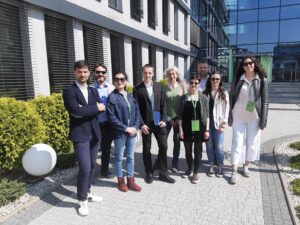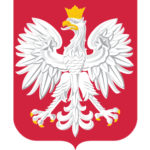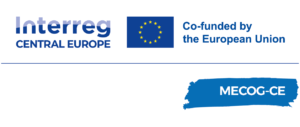
WARSZTATY DLA STUDENTÓW PODCZAS TRANSFORM4EUROPE WEEK
Pracownicy Instytutu Socjologii: dr Agata Zygmunt, dr Łukasz Trembaczowski, dr Witold Mandrysz i dr hab. prof. UŚ Rafał Muster, podczas Transform4Europe Week, który odbył się w Katowicach w dniach 9-13. maja br. zorganizowali dla doktorantów z partnerskich europejskich uczelni warsztaty pt.: JUST TRANSITION – FORM GRASSROOTS TO RESEARCH AND BACK. Doktoranci uczestniczyli w wykładach i warsztatach odnoszących się do problematyki społecznych aspektów transformacji górnictwa węgla kamiennego. Dr Witold Mandrysz omówił m.in. zagadnienia ubóstwa w regionie poprzemysłowym. Dr Łukasz Trembaczowski odniósł się do wyzwań sprawiedliwej transformacji, a dr hab. prof. UŚ Rafał Muster omówił problematykę rynku pracy województwa śląskiego. Pracownicy IS zorganizowali doktorantom wycieczkę do dzielnicy Kafhaus w Rudzie Śląskiej, gdzie mieli możliwość zobaczenia jednego z najważniejszych przykładów osiedla robotniczego w regionie oraz poznać problemy społeczne szczególnie wyraźnie występujące w tej lokalnej społeczności. Doktoranci ponadto mieli możliwość zobaczenia w Euro-Centrum wystawy poświęconej sprawiedliwej transformacji, gdzie radny katowicki – Pan Patryk Białas opowiadał o procesach transformacji w województwie. Doktoranci odbyli także spacer badawczy po Katowicach.
Zajęcia z doktorantami zakończyły się całodziennymi warsztatami, które zostały przeprowadzone przez dr Agatę Zygmunt w oparciu o założenia metodologii diagnozy partycypacyjnej. Doktoranci w oparciu o zdobytą wiedzę wypracowali koncepcję metodologii diagnozy społeczności lokalnej w warunkach restrukturyzacji gospodarczej.
31.5.2023
On 30–31 May 2023, representatives of European metropolitan areas, universities and associations met in Brno for the official launch of the MECOG-CE project (Strengthening Metropolitan Cooperation and Management in Central Europe). The project is funded via the Interreg Central Europe programme, and Brno is the first Czech city to be its leading partner.
The purpose of the MECOG-CE project is to strengthen metropolitan cooperation and management in Central Europe. It is divided into three phases. The first phase will focus on benchmarking, mapping the current situation of territorial and strategic planning in Europe. The second phase will identify the best tools and methods to strengthen metropolitan cooperation and management, and the final phase will involve the practical implementation of these tools and methods by the participating cities and metropolitan areas.
The Mayor of Brno Markéta Vaňková explained the city’s participation: “Brno has been acting as an initiator and facilitator of metropolitan cooperation within the Czech Republic for many years, and I am pleased that we are increasingly building a strong profile in Europe. This is the first time that the city is a leading partner in such a project, and we are keen to make full use of this opportunity. We will harness the project outcomes in order to appeal for changes in European and national policy.”
Martin Příborský, a member of Brno’s City Assembly with responsibility for strategic development, metropolitan cooperation and integrated territorial investments, launched the meeting and spoke about the benefits the project can bring to partners: “I am confident that during the project we will identify the best tools and examples of good practice in metropolitan cooperation and management, enabling us to apply them in our own metropolitan areas. The key aim of this is to boost our citizens’ quality of life.”
Brno is the leading partner and initiator of the project. Other partners include the cities of Warsaw and Ostrava and the metropolitan areas of Stuttgart, Turin, and Berlin-Brandenburg. The metropolitan areas of Milan and Upper Silesia are associated partners. Research institutions participating in the project are Charles University (Prague), the Silesian University (Katowice), and the Metropolitan Research Institute (Budapest). Other associated partners include the Union of Polish Metropolises, the Czech Ministry for Regional Development, and associations representing European metropolitan networks and structures (Eurocities, Metrex).
The meeting was attended by 30 representatives of the project partners. Experts gave presentations on metropolitan issues, tracing the history of metropolitan cooperation in their home regions and in Central Europe. Participants learned how metropolitan cooperation will be coordinated in the upcoming years, as well as discussing some key organizational parameters that must be observed in a project of this size and scope.
The meeting included two workshops led by experts from Charles University and the Silesian University, in which members of the project consortium shared information about the challenges and opportunities of cooperation between cities and municipalities in their regions. The biggest challenges are connected with adaptation to climate change, sustainable mobility, and systems formalizing cooperation between cities and nearby municipalities in order to maximize participation.The task now facing the project partners is to map the current situation and identify the best tools and examples of good practice. The partners will then work in compact research teams to assess the transferability of these tools into their own metropolitan areas. The cooperation will also include pilot projects, which will enable selected tools and methods to be tested in real conditions.
The project will help raise awareness of metropolitan issues among European and national-level institutions, reflecting the crucial importance of the metropolitan dimension. The project will run until the spring of 2026.






